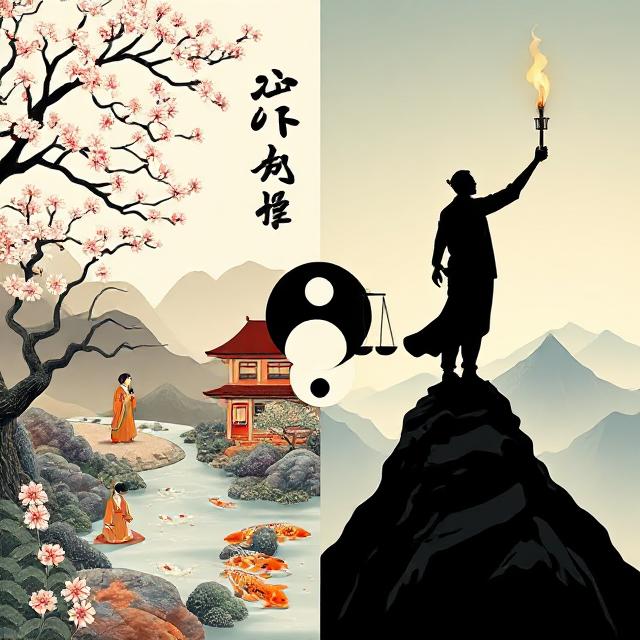Category: Branches of Philosophy
-
Hindu Dharma vs Greek Arete: Two Visions of Virtue

Hindu Dharma vs Greek Arete: Two Visions of Virtue Hindu Dharma vs Greek Arete is a philosophical juxtaposition that explores how ancient Indian and Greek traditions defined a meaningful life. Both systems emphasize the cultivation of virtue, yet they take radically different paths: Dharma focuses on one’s cosmic duty and role, while Arete emphasizes personal…
-
Zen Koans vs Socratic Dialogues: Paths to Enlightenment

Zen Koans vs Socratic Dialogues: Paths to Enlightenment Zen Koans vs Socratic Dialogues offers more than a cultural contrast between East and West. It presents two radical forms of philosophical questioning that stretch the human mind beyond convention: one aiming to break logic with paradox, the other sharpening logic with precision. But both seek the…
-
East’s Focus on Harmony vs West’s Focus on Autonomy: Two Paths of Thought

East’s Focus on Harmony vs West’s Focus on Autonomy: Two Paths of Thought The philosophical divide between East’s focus on harmony vs West’s focus on autonomy reaches deep into how cultures define the self, construct societies, and envision the good life. At its heart is a question: should individuals strive to fit seamlessly into a…
-
Dualism in Zoroastrianism vs Christianity: Two Visions of Good and Evil

Dualism in Zoroastrianism vs Christianity: Two Visions of Good and Evil Dualism in Zoroastrianism vs Christianity reflects two of the most influential frameworks for understanding the cosmic tension between good and evil. Both traditions present the universe as a battleground—spirit vs. flesh, light vs. darkness, God vs. adversary. But while their imagery and themes often…
-
Can Science and Religion Coexist? A Dialogue Between Wonder and Reason

Can Science and Religion Coexist? A Dialogue Between Wonder and Reason Can science and religion coexist—or are they destined to conflict, forever pulling humanity in opposite directions? This age-old question lies at the heart of one of the most profound intellectual and spiritual struggles in human history. On one side, science: empirical, testable, skeptical. On…
-
Why Some Religions Reject Icons and Images: The Power and Peril of Representation

Why Some Religions Reject Icons and Images: The Power and Peril of Representation Why some religions reject icons and images is a question that reveals deep spiritual, philosophical, and psychological concerns. The act of creating images—of gods, prophets, or divine truths—has been celebrated in some cultures and condemned in others. At the heart of the…
-
Daoist Wu Wei vs Stoic Ataraxia: Two Ancient Paths to Peace

Daoist Wu Wei vs Stoic Ataraxia: Two Ancient Paths to Peace Daoist Wu Wei vs Stoic Ataraxia offers a profound comparison between Eastern and Western philosophies of inner calm. Despite arising from radically different traditions, both Daoism and Stoicism point to a life of serenity—but by distinct means: the Chinese Daoist ideal of effortless action…
-
Karma vs Causality: Spiritual vs Scientific Law

Karma vs Causality: Spiritual vs Scientific Law Karma vs causality is not simply a debate about Eastern mysticism and Western science. It’s a deep inquiry into how we explain events—whether they’re results of moral intention or impersonal laws of physics. Do we reap what we sow because the universe keeps score? Or is every event…
-
The Problem of Evil in East and West: A Comparative View

The Problem of Evil in East and West: A Comparative View The question of evil has perplexed human thought across cultures and millennia. Why does evil exist if the universe is guided by a higher power or cosmic order? This dilemma, known as the problem of evil, is a cornerstone in philosophy and theology. It…
-
Do All Religions Lead to the Same Truth?

Do All Religions Lead to the Same Truth? One of the most profound questions in philosophy of religion and interfaith dialogue is: Do all religions lead to the same truth? This question challenges how we understand the nature of religion, the diversity of spiritual traditions, and the possibility of universal truth. With thousands of religions…
